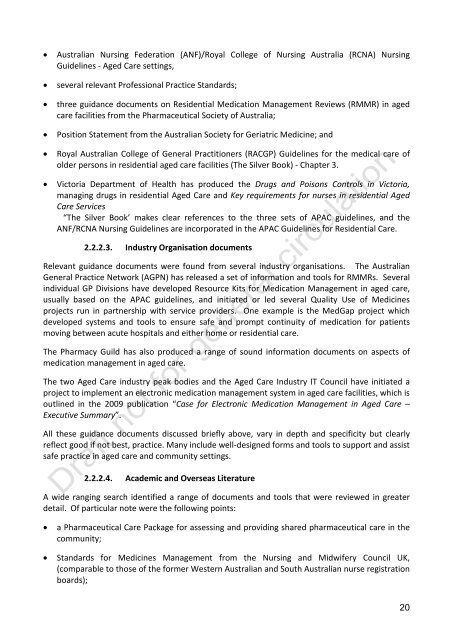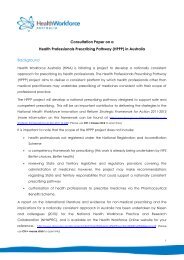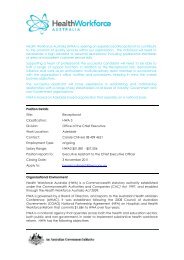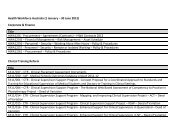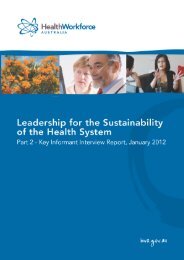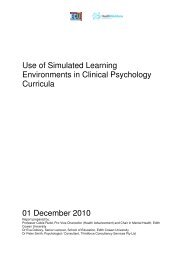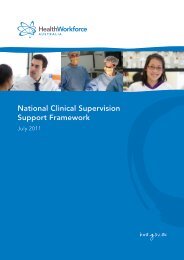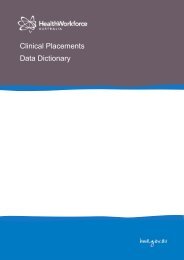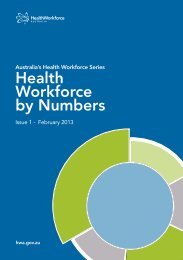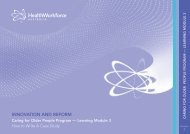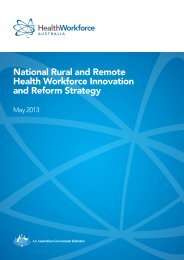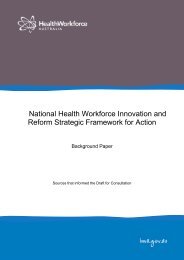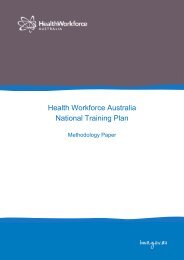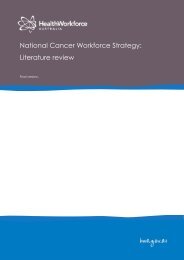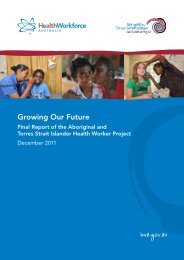SUMMARY - Safe Medications Management project: Key issues and ...
SUMMARY - Safe Medications Management project: Key issues and ...
SUMMARY - Safe Medications Management project: Key issues and ...
Create successful ePaper yourself
Turn your PDF publications into a flip-book with our unique Google optimized e-Paper software.
Australian Nursing Federation (ANF)/Royal College of Nursing Australia (RCNA) NursingGuidelines - Aged Care settings,several relevant Professional Practice St<strong>and</strong>ards;three guidance documents on Residential Medication <strong>Management</strong> Reviews (RMMR) in agedcare facilities from the Pharmaceutical Society of Australia;Position Statement from the Australian Society for Geriatric Medicine; <strong>and</strong>Royal Australian College of General Practitioners (RACGP) Guidelines for the medical care ofolder persons in residential aged care facilities (The Silver Book) - Chapter 3.Victoria Department of Health has produced the Drugs <strong>and</strong> Poisons Controls in Victoria,managing drugs in residential Aged Care <strong>and</strong> <strong>Key</strong> requirements for nurses in residential AgedCare Services“The Silver Book’ makes clear references to the three sets of APAC guidelines, <strong>and</strong> theANF/RCNA Nursing Guidelines are incorporated in the APAC Guidelines for Residential Care.2.2.2.3. Industry Organisation documentsRelevant guidance documents were found from several industry organisations. The AustralianGeneral Practice Network (AGPN) has released a set of information <strong>and</strong> tools for RMMRs. Severalindividual GP Divisions have developed Resource Kits for Medication <strong>Management</strong> in aged care,usually based on the APAC guidelines, <strong>and</strong> initiated or led several Quality Use of Medicines<strong>project</strong>s run in partnership with service providers. One example is the MedGap <strong>project</strong> whichdeveloped systems <strong>and</strong> tools to ensure safe <strong>and</strong> prompt continuity of medication for patientsmoving between acute hospitals <strong>and</strong> either home or residential care.The Pharmacy Guild has also produced a range of sound information documents on aspects ofmedication management in aged care.The two Aged Care industry peak bodies <strong>and</strong> the Aged Care Industry IT Council have initiated a<strong>project</strong> to implement an electronic medication management system in aged care facilities, which isoutlined in the 2009 publication “Case for Electronic Medication <strong>Management</strong> in Aged Care –Executive Summary”.All these guidance documents discussed briefly above, vary in depth <strong>and</strong> specificity but clearlyreflect good if not best, practice. Many include well-designed forms <strong>and</strong> tools to support <strong>and</strong> assistsafe practice in aged care <strong>and</strong> community settings.2.2.2.4. Academic <strong>and</strong> Overseas LiteratureA wide ranging search identified a range of documents <strong>and</strong> tools that were reviewed in greaterdetail. Of particular note were the following points:a Pharmaceutical Care Package for assessing <strong>and</strong> providing shared pharmaceutical care in thecommunity;St<strong>and</strong>ards for Medicines <strong>Management</strong> from the Nursing <strong>and</strong> Midwifery Council UK,(comparable to those of the former Western Australian <strong>and</strong> South Australian nurse registrationboards);20


